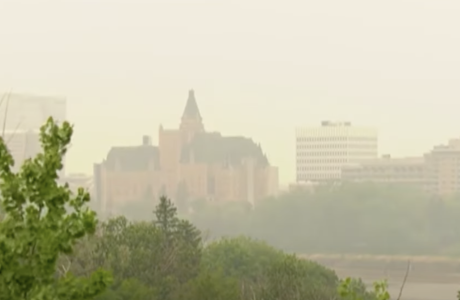Are you at risk? Cough warning expands to 3 states—Here’s what you need to know
- Replies 0
If you’ve noticed a tickle in your throat or a persistent cough lately, you’re not alone—and it’s not just allergy season playing tricks on you.
A sweeping air quality alert has just expanded across three states, urging folks—especially those of us in our golden years—to keep a close eye on any new coughs or breathing troubles.
Let’s break down what’s happening, why it matters, and what you can do to protect yourself and your loved ones.
What’s Going On?
Wildfires raging in Canada have sent plumes of smoke billowing across the border, blanketing parts of the Upper Midwest and Northeast in a smoky haze. In some cases, the smoke has affected sunsets as far south as the Gulf Coast, causing physical effects that reaches even the Plain states.
As of this week, official air quality alerts are in effect for Maine, Michigan, and Wisconsin, with additional warnings stretching into Nebraska, the Great Lakes, and the Northeast. These air quality alerts have also advised people to move indoors if they begin to cough.
Even if you’re not in one of these states, you might still notice hazier sunsets or a faint campfire smell in the air—smoke can travel hundreds, even thousands, of miles.
Why Should You Care?
This isn’t just about a little extra dust in the air. According to Dr. Scott Budinger, chief of pulmonary and critical care at Northwestern University, wildfire smoke can do more than irritate your throat.

It’s been linked to spikes in heart attacks and strokes, especially among older adults and those with pre-existing conditions like asthma, COPD, or heart disease.
The main villain here is something called PM2.5—tiny particles in the smoke that are small enough to slip deep into your lungs and even enter your bloodstream.
When air quality reaches the “Unhealthy for Sensitive Groups” or “Red AQI” (Air Quality Index) range, it’s time to take these warnings seriously.
Who’s Most at Risk?
- Older adults
- Children
- People with asthma, COPD, or other lung conditions
- Anyone with heart disease
- Folks who work or exercise outdoors
If you fall into one of these categories, you’re more likely to feel the effects of poor air quality—and you should be extra vigilant.
Also read: Fight fire with facts–Essential wildfire smoke safety tips that you should know
What Are the Symptoms to Watch For?
- Coughing (especially if it’s new or persistent)
- Shortness of breath
- Throat irritation
- Chest discomfort or tightness
- Unusual fatigue or palpitations (for those with heart conditions)
If you notice any of these symptoms, especially if they last more than a week or are accompanied by breathlessness, don’t brush them off—call your healthcare provider. Also, consider limiting the intensity and duration of your outdoor activities, as per the Maine Department of Environmental Protection.
In earlier news: Air quality crisis declared in major US city—residents told to stay indoors
What Should You Do Right Now?
Source: CBS Detroit / Youtube.
What’s Next?
Meteorologists say the smoke will likely linger in the Midwest, Great Lakes, and Northeast through the weekend, but concentrations should gradually decrease.
"It generally looks like the concentration will be on a downward trend, so that might mean some of the air quality won't be quite as impacted but there will likely still be periods of smoke." said Marc Chenard, NWS Weather Prediction Center meteorologist.
Still, don’t let your guard down—air quality can change quickly, and new alerts may be issued if conditions worsen.
Read next: Are you breathing right? Discover the surprising triggers behind asthmatic conditions affecting 1 in 10 Americans!

Have you noticed the smoky skies in your area? Are you taking any special steps to protect yourself or your family? Maybe you have tips for keeping indoor air clean? Share your experiences and advice in the comments below!
A sweeping air quality alert has just expanded across three states, urging folks—especially those of us in our golden years—to keep a close eye on any new coughs or breathing troubles.
Let’s break down what’s happening, why it matters, and what you can do to protect yourself and your loved ones.
What’s Going On?
Wildfires raging in Canada have sent plumes of smoke billowing across the border, blanketing parts of the Upper Midwest and Northeast in a smoky haze. In some cases, the smoke has affected sunsets as far south as the Gulf Coast, causing physical effects that reaches even the Plain states.
As of this week, official air quality alerts are in effect for Maine, Michigan, and Wisconsin, with additional warnings stretching into Nebraska, the Great Lakes, and the Northeast. These air quality alerts have also advised people to move indoors if they begin to cough.
Even if you’re not in one of these states, you might still notice hazier sunsets or a faint campfire smell in the air—smoke can travel hundreds, even thousands, of miles.
Why Should You Care?
This isn’t just about a little extra dust in the air. According to Dr. Scott Budinger, chief of pulmonary and critical care at Northwestern University, wildfire smoke can do more than irritate your throat.

Air quality alerts advising people to monitor themselves for symptoms like coughing have been issued across three states in the US—Maine, Michigan, and Wisconsin—due to smoke from Canadian wildfires. Image source: CBS Detroit / Youtube.
It’s been linked to spikes in heart attacks and strokes, especially among older adults and those with pre-existing conditions like asthma, COPD, or heart disease.
The main villain here is something called PM2.5—tiny particles in the smoke that are small enough to slip deep into your lungs and even enter your bloodstream.
When air quality reaches the “Unhealthy for Sensitive Groups” or “Red AQI” (Air Quality Index) range, it’s time to take these warnings seriously.
Who’s Most at Risk?
- Older adults
- Children
- People with asthma, COPD, or other lung conditions
- Anyone with heart disease
- Folks who work or exercise outdoors
If you fall into one of these categories, you’re more likely to feel the effects of poor air quality—and you should be extra vigilant.
Also read: Fight fire with facts–Essential wildfire smoke safety tips that you should know
What Are the Symptoms to Watch For?
- Coughing (especially if it’s new or persistent)
- Shortness of breath
- Throat irritation
- Chest discomfort or tightness
- Unusual fatigue or palpitations (for those with heart conditions)
If you notice any of these symptoms, especially if they last more than a week or are accompanied by breathlessness, don’t brush them off—call your healthcare provider. Also, consider limiting the intensity and duration of your outdoor activities, as per the Maine Department of Environmental Protection.
In earlier news: Air quality crisis declared in major US city—residents told to stay indoors
What Should You Do Right Now?
- Stay Informed: Check your local air quality index (AQI) daily. Websites like AirNow.gov or your local weather app can give you real-time updates.
- Limit Outdoor Activities: If the AQI is high, keep outdoor activities short and less intense. It’s okay to be outside, but take more breaks and listen to your body.
- Keep Windows Closed: Don’t let that smoky air inside. Use air conditioning if you have it, and consider a portable air purifier with a HEPA filter for extra protection.
- Follow Your Action Plan: If you have asthma or another lung condition, make sure you have your quick-relief inhaler handy and follow your doctor’s instructions.
- Check on Loved Ones: Reach out to friends, neighbors, and family—especially those who might not be aware of the risks or who need a little extra help.
Source: CBS Detroit / Youtube.
What’s Next?
Meteorologists say the smoke will likely linger in the Midwest, Great Lakes, and Northeast through the weekend, but concentrations should gradually decrease.
"It generally looks like the concentration will be on a downward trend, so that might mean some of the air quality won't be quite as impacted but there will likely still be periods of smoke." said Marc Chenard, NWS Weather Prediction Center meteorologist.
Still, don’t let your guard down—air quality can change quickly, and new alerts may be issued if conditions worsen.
Read next: Are you breathing right? Discover the surprising triggers behind asthmatic conditions affecting 1 in 10 Americans!
Key Takeaways
- Air quality alerts advising people to monitor themselves for symptoms like coughing have been issued across three states in the US—Maine, Michigan, and Wisconsin—due to smoke from Canadian wildfires.
- Health authorities are urging sensitive groups, including young children, the elderly, people with asthma or heart disease, and those working outdoors, to limit their outdoor activities if they experience symptoms such as coughing or shortness of breath.
- Some alerts warn that air quality may reach “Unhealthy for Sensitive Groups” and possibly the "Unhealthy" range for short periods, and recommend having relief medication handy and seeking medical advice if symptoms persist longer than seven days.
- Meteorologists predict the concentration of smoke should gradually decrease over the coming weekend, but periods of poor air quality could still occur until the alerts expire or are reissued.
Have you noticed the smoky skies in your area? Are you taking any special steps to protect yourself or your family? Maybe you have tips for keeping indoor air clean? Share your experiences and advice in the comments below!






